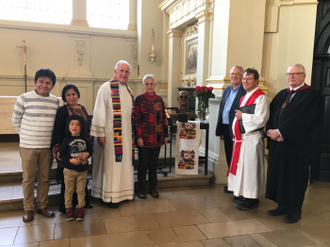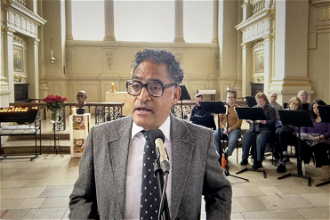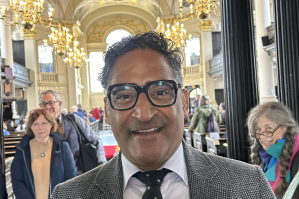Text: Martha Zechmeister CJ - Romero Week Lecture 2017

Sr Martha (centre) with l-r: Phaksi Coca, Fr Joe Ryan, Julian Filochowski, Rev Richard Carter, Rev David Cornick
Sister Martha Zechmeister CJ gave the following address on Saturday, at the National Ecumenical Service for Romero Week 2017 at St Martin in the Fields, Trafalgar Square, London, entitled: The Secret of Romero: Passion for God and Compassion for the Poor "Over these ruins of ours the glory of the Lord will shine"
Archbishop Oscar Romero spoke these words that we heard just now in his cathedral in San Salvador on the Feast of the Epiphany in 1979. It was in the midst of a desperate situation, prior to the outbreak of the civil war: people were being sacrificed on the altar of wealth, they were being cut down in their struggle for a life of dignity and they were exposed to cruel and barbaric violence. They were expelled from their homes and their land, living in a nightmare of torture, of overnight escapes and separation from their loved ones.
Romero describes the atmosphere of his home country at that moment without any illusions, using the words of Isaiah: "there are only ruins here, there is nothing more than pessimism, a tremendous sense of frustration." And so what the prophet was saying about Jerusalem, Romero is applying to the situation of El Salvador. He continues in his own words: "our human strength can do no more... we are stuck in a dead-end alley ... ... Politics and diplomacy achieve nothing here, everything is destruction and disaster, and to deny it is madness."
I think many of us here are beginning to feel the same way with respect to our actual global situation: we are stunned by the interminable vicious circle of war and violence in the Middle-East and in other conflictive zones of our world. The tentacles of terror are reaching out to the capitals of Europe. (We are shocked by the attack in the heart of London: five dead and over 40 injured. And this atrocity was carried out exactly on the first anniversary of the Brussels killings when people were mourning those victims).
There are more than 60 million refugees worldwide, driven from their homelands by violence, hunger, poverty and climate change - and the "First World" seems to be riven with the fear of being overcrowded by the migrants and becoming ever more vulnerable. In consequence Europe is seeking to convert itself into a fortress constructed against "these invaders". But as we know there are also still more marginalized and excluded people in the midst of the rich "developed nations", who feel themselves betrayed by the political establishment. And finally we are confronted with the seemingly unstoppable rise of irresponsible populists and nationalists all over the world.
It seems that our world is getting a little bit out of control, that it is falling apart - and we are in danger of being overwhelmed and paralyzed by fear and anxiety. Here and now we are sharing with the people of El Salvador the awful experience that our world is in a great mess and that we are stumped - and that sometimes we are tempted to despair.
Exactly into this situation come those prophetic words of Oscar Romero: "Over these ruins of ours the glory of the Lord will shine. That is the great mission that Christians have at this critical moment: keeping hope alive."
But - if actually we face up to the crude facts, what is it in the end that can justify our persistent confidence? What can strengthen our tenacity, to pin all our hopes on God and on the "transcendent salvation" that Romero evokes? As an attempt to answer that, I will offer you my experience with El Salvador and with Archbishop Oscar Romero.
El Salvador and Oscar Romero taught me what it truly means to be a Christian.
Romero became really meaningful to me through an experience I had in "La Chacra", a slum area in the suburbs of San Salvador. It was during the all-night vigil celebrated on 24 March 1999, the anniversary of Romero's assassination. On that night one family after another described, in front of the whole assembly, how their relatives and friends had disappeared and had been tortured and murdered during the years of the civil war.
The martyrs of El Salvador were truly present there to testify to resurrection and as witnesses not only to God, who does not allow these victims to vanish in death, but also as witnesses to a life that takes the risk of 'making a stand against death' here in this place and now in this time. That was a night of many tears and great distress, yet it also brought us into the 'real presence' of radiant humanity and the authentic experience that Romero's death was a source of life for us. A source of life that helps us to resist despair and can give staying power - perseverance - to our hope.
El Salvador, with its martyrs who sealed the Gospel with their blood, became for me a "Holy Land". It became for me a privileged place where I was confronted with the drama of Jesus in a frighteningly current way - and it was the first time in my life I understood what it truly means to be a Christian.
It's not sophisticated, it's very simple: Christians are those people who follow Jesus, and who do what he did. They risk their own lives by taking sides - without any ifs or buts - alongside the vulnerable, those in danger and those excluded. But in spite of the simplicity of this message, we all know that we are unable to cope with this essential challenge of the Gospel. When it really happens, it is not our merit, it is not the result of our ethical efforts - it is the unexpected irruption of God`s grace and mercy.
With Archbishop Romero, God's grace irrupted into the midst of the cruel reality of El Salvador. So, the theologian, Ignacio Ellacuria, far from reciting pious platitudes, declared at the moment of the assassination of Romero: "With Archbishop Romero, God passed through El Salvador". Yes, Oscar Romero is a true incarnation of God's mercy and love in that historic moment; he is a "sacrament of Jesus Christ", the real presence of the whole drama of the life of Jesus. His assassination confronts us with the cross of Jesus - as a consequence of his Jesus-like way of living. Therefore, Romero`s life and Romero`s death - like the life and death of Jesus - become an unfailing source of Christian hope and joy.
Living this core of the Christian life with such integrity, Romero also had a very clear view of what is the essence of the Church and what has to be her mission. The Church, as the community of those who follow Jesus, has to make the Gospel present, here and now, as a liberating and redeeming reality in the midst of whatever is oppressing and enslaving people. In the words of Romero himself: "A Church that does not join the poor in order to speak out on behalf of the poor and against the injustices committed against them, is not the true Church of Jesus Christ... The voice of the Church has always been the voice of the Gospel --- it can be nothing else. Many times this Gospel touches the open wounds of society and it is natural that it should sting and cause pain."
As he took up this vocation Oscar Romero was transformed into one of Christianity's outstanding prophets. He himself defines what it means to be a prophet: "The prophet is the watchman who keeps vigil. When God tells the evildoers to be converted, the prophet has to sound the trumpet of God and tell the evildoers to repent. ..."
As a bishop, Romero considered himself as the guardian of his brothers and sisters, called to protect and defend them. Certainly it was a highly risky task to sound the trumpet, to bring to public light, that evildoers were threatening and damaging the lives of his people, motivated by greed or other egocentric interests. Romero by his natural temperament wasn`t a "trumpet"; in fact he was a calm, peaceful and shy man. But he accepted the hazardous burden of confronting the oppressors with their crimes. And most of them had the benefit of great wealth or high office with political or military power behind them.
Even so he encouraged his priests, his fellow pastoral workers - and every one of us to take this risk: "Do not be false in your service to this ministry. It is very easy to be servants of the word without disturbing the world: a very spiritualized word, a word without any commitment to history, a word that can sound in any part of the world because it belongs to no part of the world. A word like that creates no problems, starts no conflicts."
Remembering Archbishop Romero, remembering the martyrs, and celebrating them, is a dangerous thing to do. It obliges us, like them, to let ourselves be touched in our innermost being, by the anguish that the victims of exclusion, discrimination and impoverishment suffer today. It obliges us to risk what seems like self-destructive insanity: in Bonhoeffer's words, to throw ourselves, with all of our existence, against those systems that crush and exclude the vulnerable.
To remember the body and blood of the martyrs, among them, the proto-martyr Jesus of Nazareth, does not allow for any kind of diluted celebration. It either draws us into following those martyrs, or the celebration is a lie, and carries within itself "its own judgment" - as Corinthians tells us.
To be faithful to the legacy of the martyrs of El Salvador, we are obliged to practice a patient exercise of contemplation, of paying close attention to the situation in which the crucified people live today. If we do it well, it will hurt. Only from such pain can a new pastoral word and action be born, pastoral action that is effective and hope-giving.
In an audacious and courageous way, Romero identifies the cross of Jesus Christ with the horror that the people lived through in his time. They were exposed to violence, cruelty, and humiliation. He affirms the inseparable connection, between the crucified people and the crucified Christ. They are one single flesh and cannot be separated.
When we Europeans are speaking about martyrs we are always in danger of provoking depression and feelings of guilt. This is not the Gospel and it is not Oscar Romero!
However paradoxical it may seem, the most vulnerable, the marginalized people of El Salvador and the poor all over the world, can teach us, what it means to celebrate the martyrs. To follow in their footsteps is not forcing ourselves into some kind of moral and ascetic performance, but rather something that enables us to become more human and fully alive. Following in their footsteps we become liberated from our paralysis and depression and we are empowered to joyful action. 'Whoever loses his or her life . . . will gain it.'
Hope - as a "divine virtue"
Christian hope is not the starry-eyed confidence that somehow everything will go well - it is not the pious variant of "positive thinking", the self-centered autosuggestion that: "nothing bad will happen to me". Christian hope is far more radical, it does not trivialize these forces that have the power to bring suffering and to destroy the lives of others. The meaning of Christian hope reveals itself only as we face the victims. If there is no hope for them, then certainly there is no hope for us. Christian hope is the vigor of the heart, capable of resisting and rejecting the imposition of the "law of the strongest" as the inevitable "law of nature". Hope is stubborn enough not to accept, that the victims are the inevitable collateral damage of human history.
Our God is the solemn promise that the evildoers of this world WILL NOT HAVE THE LAST WORD. This confidence, that GOD will have the last word, transformed the shy man of El Salvador into a courageous prophet. With him the saving and life-giving love of God passed through El Salvador, and was present amongst us.
Blessed Oscar Romero, servant of God, faithful follower of Jesus Christ, friend of the poor, voice of the voiceless - Pray for us.
Read more about the Romero Trust: www.romerotrust.org.uk
See also: London: 'Oscar Romero's message is more relevant than ever today' www.indcatholicnews.com/news.php?viewStory=32214





















